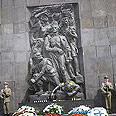
Now, men such as Tad Taube, Sigmund Rolat and Severyn Ashkenazy have returned to Poland as philanthropists – after making fortunes in the United States – to nurture a grass-roots revival of Jewish life in their homeland.
"What the philanthropists have done - along with the importance of the material donation - is also empowered us, encouraged us, let us know we're not alone," Said Poland's Chief Rabbi Michael Schudrich, an Orthodox leader from New York. "And that cannot be underestimated."
Suppressing one's identity
Following Germany's invasion of Poland in September 1939, about 3 million Polish Jews were murdered in Nazi-run death camps in occupied Poland. Of those who survived, many later fled in reaction to anti-Semitic violence or repression under communism, which eventually fell in 1989.
Of those who remained, many suppressed their identities and intermarried with the Roman Catholic majority, making it difficult to say how many Jews live in this country of 38 million today. However, some estimates put the numbers of people with some Jewish ancestry at between 10,000 and
30,000.
Taube, Rolat and Ashkenazy say Polish Jews, who are often struggling economically, need help in rebuilding a community that hopes to reclaim its place in a country where Jews lived and prospered for a thousand years.
"The population doesn't have a reasonable chance if there aren't institutions in place to support them," Says Taube, who left Poland weeks before Hitler's tanks rolled across the border in their Blitzkrieg attack that started World War II.
And so, foreign donors have stepped in to fill the void, funding everything from Hebrew classes and rabbis to big ticket items like the annual Jewish Culture Festival in Krakow and Warsaw's landmark Museum of the History of Polish Jews, due to open in 2009.
Ronald S. Lauder, the US cosmetics heir, was among the first foreign philanthropists to take an interest in rebuilding Jewish life in Poland and Eastern Europe in the late 1980s. More recently, as the indigenous Jewish community has grown in this young democracy, more philanthropists have begun to help.
Rebuilding Jewish life
Since launching operations in Poland more than three years ago, Taube's foundation has donated some $2 million annually and encouraged other donors to contribute another $8 million to help fund rabbis, educational programs, summer camps, day schools, as well as the Krakow festival and the Warsaw museum.
Taube says he wants to focus on Poland's living Jews, not on those wiped out in the Holocaust. "The preoccupation of Jews in most of the Diaspora is of Poland as a cemetery for Jews," He said during a recent visit to Warsaw. But his philanthropy efforts are "About Jewish life in Poland, not Jewish death."
Rolat, who closely cooperates with Taube and is involved in a host of similar projects, has also worked extensively in his hometown of Czestochowa to put its tiny surviving Jewish community back on its feet.
And there are signs of renewed vigor - and complexity - in Jewish life across Poland. Ashkenazy survived the war in an underground bunker in the Polish city of Tarnopol, in what is now Ukraine.
After the war he moved to France before settling in the United States where he, like Taube, made his fortune in real estate. Ashkenazy got involved in Poland in 1999, when he helped launch Beit Warszawa, Poland's first Progressive, or Reform, community since World War II.
Beit Warszawa, which started as a handful of foreigners meeting in their homes, now has some 200 active members, and its own center for Sabbath services, meals, bar mitzvahs and other events.
Rabbi Burt Schuman arrived last year, becoming the country's first full-time Progressive rabbi since the Holocaust, and a second rabbi started this year, Tanya Segal, a Russian-born Israeli who is the country's first permanent woman rabbi.
'Someone needed to do it'
"Someone needed to do it, and the perennial question is if not me, who, and if not now, when," Ashkenazy says. "It needed to be done. It still needs to be done. It's in its infancy, progressing, taking roots. We need support, we need help."Rolat, who worked as a slave laborer in camps near his hometown of Czestochowa during the war, left Europe for the US in 1948 as the sole survivor of his family. He acquired his wealth running international finance companies.
He has helped fund Warsaw rabbis, book publishing and educational programs to promote Jewish culture in Polish schools, but has also spent great effort to revive the Jewish community in his native Czestochowa. He is also involved in efforts to promote Polish-Jewish relations.
All three men speak openly of their love for Poland, and stress that the country was a true home for Jews for a millennium, where their people achieved great things in the arts, sciences and politics.
"Poland really was more than just a country where Jews took refuge," Rolat said in Warsaw. "Poland was really our home."















